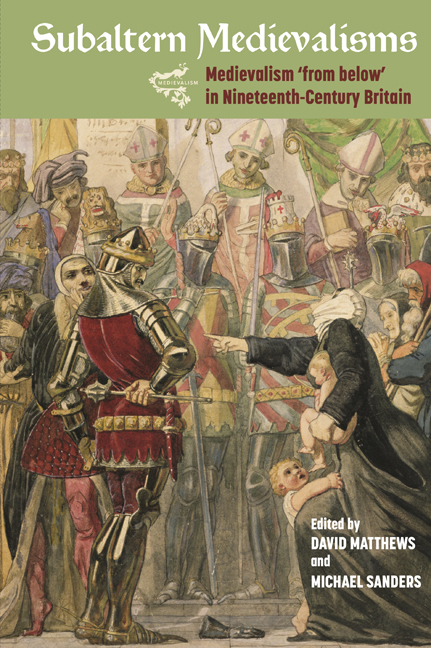Book contents
8 - Serfs, Saints and Comrades: Working-Class Medievalism and the Narratives of Victorian Socialism
Published online by Cambridge University Press: 09 February 2021
Summary
ON THE DEATH of William Morris in 1896, the socialist journal Justice published a memorial poem by John Leslie, Scottish-Irish activist, entitled ‘William Morris: A Proletarian's Tribute’. In its final stanza Leslie hails Morris, on behalf of ‘we the poor’ as ‘our stainless Bayard, brave comrade’. While it might seem unremarkable to use such an appellation for Morris, well-known for the medievalism of his art and writings, it is significant that he is not only the famously ‘Spotless and Fearless Knight […], a model of manly virtues’ here, but also a ‘comrade’, an equal; no less significant is the easy familiarity with which Leslie uses the medieval reference point. As this chapter will show, the recurring and deftly handled presence of medieval figures, themes and stories in the writings of working- class socialists suggests a far more pervasive, politically deliberate use of the Middle Ages than the critical focus on Morris as the key figure of Victorian socialist medievalism has allowed. Various forms, both serious and comic, of the medievalism so closely associated with Morris appear again and again in the newspapers cen tral to the development and articulation of socialism in the late nineteenth century. While some of these instances occur directly in reference to Morris, as in the case of Leslie's poem, or in dialogue with Morris and his work, a commitment to the use of the medieval to establish transhistorical kinships and cultural affiliations, to turn a defamiliarising critical eye on contemporary social structures and to develop a coherent, culturally confident community goes well beyond borrowings or tributes in content, form or thought.
The newspapers that proliferated in the 1890s and the social activities that grew up around them contributed significantly to the creation of a socialist culture. Their task, outlined with slight variations in each paper, was, as the Scottish socialist John L. Mahon said of the movement's propaganda more broadly, ‘to take hold of the working-class movement as it exists at the moment and gently and gradually mould it into a socialist shape’. Elizabeth Carolyn Miller's argument that radical press poetry in this period encapsulates in form and content the idea ‘that one can engage and transform dominant culture from within the forms of that culture’ echoes Mahon's articulation of intent and might well be applied to the fin-de-siècle socialist press as a whole and to its uses of medievalism in particular.
- Type
- Chapter
- Information
- Subaltern MedievalismsMedievalism 'from below' in Nineteenth-Century Britain, pp. 143 - 159Publisher: Boydell & BrewerPrint publication year: 2021



